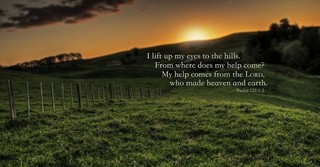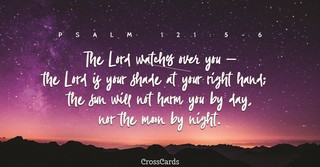
Change Translation
- Recent Translations
- All Translations
Psalm 121:6
Share
Listen to Psalm 121:6
Settings
Scripture Text Size
Psalm 121:6 Meaning and Commentary
Psalms 121:6
FOOTNOTES:
F16 observes, thus, "neither shall the moon cool thee by night"; for that has no warmth in it, and cannot smite with heat, as the sun does: for even, as he observes, its rays focused by a magnifying glass will not communicate the least degree of sensible heat to bodies objected thereunto; yet some say F17 the moon is not only moist, but heats bodies as the sun. And Isaac Vossius F18 observes, that there can be no light, which, separately considered, does not contain some heat at least: and Macrobius F19 speaks of the lunar heat; and Plutarch F20 ascribes heat and inflammation to it, and asserts it to be fire. It is said F21 that some men of good credit, in a voyage to Guinea, strongly affirmed, that, in the night season, they felt a sensible heat to come from the beams of the moon. The Septuagint version is, "the sun shall not burn thee by day, nor the moon by night". And burning may be ascribed to the cold frosty air in a moonlight night, as to the north wind, as in the Apocrypha:
F15 Macrob. Saturnal. l. 1. c. 17.
F16 Scheuchzer. Physic. Sacr. p. 976, 977.
F17 Suidas in voce (selhnh) ; so Theodoret.
F18 De Motu Marium & Vent. c. 6. Vid. Senecae Nat. Quaest. l. 5. c. 9.
F19 Saturnal. l. 7. c. 16.
F20 De Facie Lunae, in tom. 2. p. 933.
F21 The Second Voyage in Eden's Travels, p. 350. 2.
F23 "----The parching air----Burns frore (frosty) and cold performs the effect of fire". Milton's Paradise Lost, l. 2. v. 594.
The sun shall not smite thee by day
With its rays, which it shoots forth like darts, and which fly swiftly, and pierce and hurt: hence Apollo, the same with the sun, is represented with a bow and arrows F15; so the rays of the sun seem to be called in ( Habakkuk 2:11 ) ;
nor the moon by night;
this clause should be supplied, as a learned man
F16 observes, thus, "neither shall the moon cool thee by night"; for that has no warmth in it, and cannot smite with heat, as the sun does: for even, as he observes, its rays focused by a magnifying glass will not communicate the least degree of sensible heat to bodies objected thereunto; yet some say F17 the moon is not only moist, but heats bodies as the sun. And Isaac Vossius F18 observes, that there can be no light, which, separately considered, does not contain some heat at least: and Macrobius F19 speaks of the lunar heat; and Plutarch F20 ascribes heat and inflammation to it, and asserts it to be fire. It is said F21 that some men of good credit, in a voyage to Guinea, strongly affirmed, that, in the night season, they felt a sensible heat to come from the beams of the moon. The Septuagint version is, "the sun shall not burn thee by day, nor the moon by night". And burning may be ascribed to the cold frosty air in a moonlight night, as to the north wind, as in the Apocrypha:
``20 When the cold north wind bloweth, and the water is congealed into ice, it abideth upon every gathering together of water, and clotheth the water as with a breastplate. 21 It devoureth the mountains, and burneth the wilderness, and consumeth the grass as fire.'' (Sirach 43)see ( Genesis 31:40 ) ; and our English poet F23 expresses a sentiment to this effect; yet not what affects the bodies of men, but plants, trees, &c. and this not owing to the moon, but to the air. However, these clauses are not to be understood literally; for good men may be smitten and hurt by the heat of the one and the cold of the other, as Jacob and Jonah, ( Genesis 31:40 ) ( Jonah 4:8 ) ; but mystically, of persecuting antichristian tyrants, which are sometimes signified by the sun and moon, as both in Rome Pagan and Papal, ( Revelation 6:12 ) ( 16:8 ) ; and of persecution and tribulation itself, ( Matthew 13:6 Matthew 13:21 ) ( Song of Solomon 1:6 ) ; and is sometimes applied to the perfect state of the saints, either in the New Jerusalem, or ultimate glory, when there will be nothing more of this kind, ( Revelation 7:15 Revelation 7:16 ) . And there are some periods in the present state, when those entirely cease; nor are the saints ever really hurt by them, they being always for their good; or, however, not so as to affect their eternal happiness. The Targum is,
``in the day, when the sun rules, the morning spirits shall not smite thee; nor the nocturnal ones in the night, when the moon rules.''
F15 Macrob. Saturnal. l. 1. c. 17.
F16 Scheuchzer. Physic. Sacr. p. 976, 977.
F17 Suidas in voce (selhnh) ; so Theodoret.
F18 De Motu Marium & Vent. c. 6. Vid. Senecae Nat. Quaest. l. 5. c. 9.
F19 Saturnal. l. 7. c. 16.
F20 De Facie Lunae, in tom. 2. p. 933.
F21 The Second Voyage in Eden's Travels, p. 350. 2.
F23 "----The parching air----Burns frore (frosty) and cold performs the effect of fire". Milton's Paradise Lost, l. 2. v. 594.
Taken from John Gill's Exposition of the Bible
Unlock Deeper Insights: Get Over 20 Commentaries with Plus! Subscribe Now
Psalm 121:6 In-Context
4
Behold, he who keeps Israel will neither slumber nor sleep.
5
The Lord is your keeper; the Lord is your shade on your right hand.
6
The sun shall not strike you by day, nor the moon by night.
7
The Lord will keep you from all evil; he will keep your life.
8
The Lord will keep your going out and your coming in from this time forth and forevermore.
The Holy Bible, English Standard Version® (ESV®) © 2001 by Crossway, a publishing ministry of Good News Publishers. All rights reserved. ESV Text Edition: 2025

